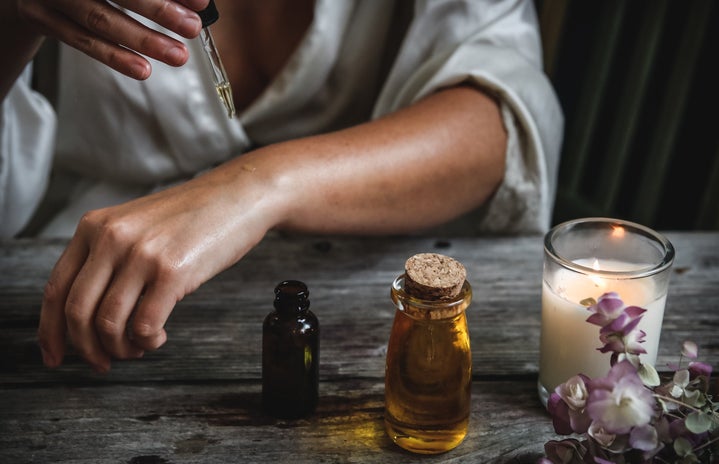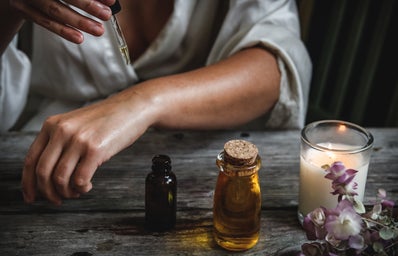What is Aromatherapy?
Aromatherapy is a fun and natural way to relax and destress in any environment. It is a healing method that uses essential oils, natural plant extracts, and other aromatic compounds to promote wellbeing and overall health (emotional, psychological, and physical). Aromatherapy dates back to the ancient Egyptians and has been practiced all over the world. With the number of products and methods of using aromatherapy, it’s easy to tailor to your liking!
How it Works
Aromatherapy can function through your sense of smell or absorption through the skin. When you inhale aromatics, odorant molecules stimulate smell receptors, which send sensory information to the brain. The amygdala – the emotional center of the brain – is influenced by these smells and can elicit positive reactions.
Absorption of essential oils through the skin is more direct. When applied topically through the likes of massages and baths, the essential oils enter the bloodstream and circulate through the body to deliver benefits to various systems and organs.
Some precautions to remember when using essential oils and aromatics for the best and safest results:
- Consider purity, quality, and brand reputation when choosing reliable and authentic oils.
- Check with others for scent sensitivity or allergies before use.
- Dilute! Essential oils are highly concentrated, so they should be added to base products (water, lotions, creams) or diluted in a carrier oil (coconut, jojoba, olive, almond, grapeseed, and avocado are common oils).
- Don’t use photo-sensitive essential oils before sun exposure to prevent irritation and burns.
- Stick to 30- to 60-minute diffusing intervals to avoid adverse effects and stress on the body.
- Diffuse the aromatics in a well-ventilated area. Overstimulation may irritate the respiratory system.

Benefits of Common Essential Oils
Bergamot
Elevate your mood and brighten your day with this sunny yet tart scent. Bergamot essential oil comes from the Citrus bergamia fruit, which is a hybrid of oranges and lemons. Besides lessening anxiety levels, bergamot has pain-relief and anti-inflammatory properties that improve skin health. Fun fact: bergamot gives Earl Grey tea its flavor and smell.
Cedarwood
Cedarwood, derived from cedar trees, smells warm, earthy, and woody. It relieves anxiety and stress, and it combines nicely with lavender. Cedarwood has antimicrobial and antiseptic properties, so it can improve skin conditions and promote hair growth.
Chamomile
Catch some much-needed Z’s with this daisy-like flower. Chamomile contains the antioxidant apigenin, which may induce muscle relaxation and sedation, helping combat insomnia. Other benefits include elevating overall mood, aiding digestion, reducing anxiety, and increasing relaxation levels. Aside from being an essential oil, chamomile is also a tea. Drink the tea about 45 minutes before bed to get some restful sleep.
Eucalyptus
When warding off the common cold or flu, it may be useful to have eucalyptus handy! Eucalyptus promotes respiratory health by relieving coughs and nasal congestion. The cineole in this plant is known for its ability to clear mucus and ease muscle spasms. Eucalyptus is also great for instant energy and skin health, specifically in fighting inflammation and promoting healing.
Lavender
Don’t stress; relaxation is just a whiff away! Lavender is prized for its multipurpose use, though most notable are the abilities to lessen anxiety and calm the mind. This light flower can also induce a better night’s sleep, reduce stress, and heal burns/bug bites with its antiseptic and anti-inflammatory properties. Some believe that it helps with premenstrual syndrome (PMS) symptoms too. Run a bubble bath; make a lavender sachet; light a candle. The versatility of lavender is endless!
Peppermint
The refreshing and powerful cooling sensation from peppermint is popular for digestive health and treating body pains. Conditions like irritable bowel syndrome (IBS), nausea, and headaches can be relieved when applied to the skin. The minty scent may also awaken the mind and give you a boost of energy.
Rosemary
Stay focused and work more productively with rosemary! Inhaling rosemary prevents the breakdown of acetylcholine, a brain chemical that contributes to concentration and memory. Higher acetylcholine levels may improve brain function. Rosemary is also known for its blood-circulating properties, which is essential for delivering oxygen and nutrients to many vital organs (like the brain).
The freedom of curating a collection of scents that fit your unique lifestyle is inviting and exciting! Welcome to the world of aromatherapy!




